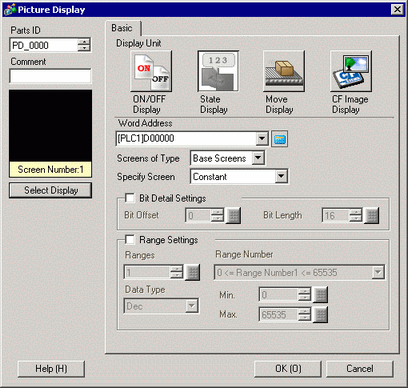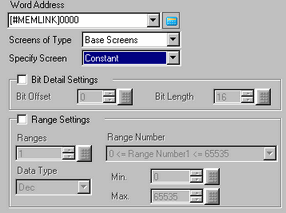

Screens of Type
Select the screen type to display.
Base Screen
Displays a base screen.
Image (Display Unit)
Displays an image screen.
Image CF/Image SD
Displays the image screen saved in the CF card/SD card.
Specify Screen
Select the designation method of a screen to display from [Constant] or [Address].
Constant
Displays a Base screen or Image screen based on the value stored in a word address, [Bit Detail Settings], and [Range Settings].

Word Address
When neither [Bit Detail Settings] nor [Range Settings] is set:
Specifies a word address for screen display changes. The display screen number is calculated by adding the word address value with the screen number defined in the [Select Display] field.
When [Bit Detail Settings] is defined
Based on the timing of changes to the bit address in the word address defined here, screen changes occur in sequential order from the start screen defined in the [Select Display] field.
When [Range Settings] is defined
In response to the range of data changes, screen changes occur in sequential order from the start screen defined in the [Select Display] field.
Bit Detail Settings
Set which bit in the word address to assign for display. The display data is determined by the [Bit Offset] and [Bit Length] settings.
Bit Offset
Set which bit in the Word Address to start to assign for display. Set the offset value from 0 to 15. Set "0" when you use all the word addresses or when offset settings are not needed.

Bit Length
Set the number of bits in the word address to assign for display. Set up the [Bit Length] from 1 to 16. When bit offset is not zero, you can set up the range as [Bit Offset] + [Bit Length] <= 16. The number of change screens is determined by the [Bit Length] settings.

Range Settings
Set the number of pictures to change and the data values at which to change to each screen. The range of data for use depends on the [Bit Detail] settings.
![]()
Data for display change is based on the bit length, defined by the [Bit Offset] from bit 0 and the number of bits from the offset.
For example, when the bit offset is "3" and the bit length is "4", the following 4 bits are used as data for change display.

Ranges
Set the number of screens to change as the number of ranges. The setting range is from 1 to 32. However, values exceeding the [Bit Length] cannot be displayed.
For example, when the bit length is "4", the number of ranges is 1 to 16.
Data Type
Select the data type from [Dec], [Hex], or [BCD], and select the Range Settings [Min.] and [Max.].
Range Number
Select the [Range Number] to set.
Min
Set the minimum value of the selected range.
Max
Set the maximum value of the selected range.
Address
The Base screen or Image screen to display is variable. Change and display screens by storing the screen numbers in the Word Address.

Word Address
Set the word address where the screen number to display is stored.
Data Type
Choose the data type of the display screen address from [Bin] or [BCD].
Offset
Set the offset value from 0 to 8999. A Base/Image screen displays. It is defined by the value in the [Display Screen Specification Address], plus the offset.